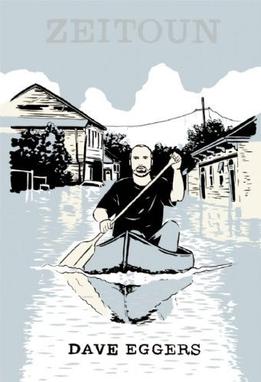 In “Zeitoun,” what Dave Eggers has found in the Katrina mud is the full-fleshed story of a single family, and in telling that story he hits larger targets with more punch than those who have already attacked the thematic and historic giants of this disaster. It’s the stuff of great narrative nonfiction.
In “Zeitoun,” what Dave Eggers has found in the Katrina mud is the full-fleshed story of a single family, and in telling that story he hits larger targets with more punch than those who have already attacked the thematic and historic giants of this disaster. It’s the stuff of great narrative nonfiction.Eggers, the boy wonder of good intentions, has given us 21st-century Dickensian storytelling — which is to say, a character-driven potboiler with a point. But here’s the real trick: He does it without any writerly triple-lutzes or winks of postmodern irony. There are no rants against President Bush, no cheap shots at the authorities who let this city drown. He does it the old-fashioned way: with show-not-tell prose, in the most restrained of voices.
____________________________
The review makes me think of Lanterns on the Levee.
Thanks for this reminder. I've enjoyed Eggers since he burst on the scene with "A Heartbreaking Work of Staggering Genius."
ReplyDeleteI have that book sitting on the shelf, but this new book has more appeal to me. Think I will read it first.
ReplyDeleteAHWSG is unusual to say the least. It is a much better book than its detractors would have you believe.
ReplyDeleteI's another fan of "A Heartbreaking Work..." and definitely want to read the new Eggers, which reminds me of another book I heard about this week, Rebecca Solnit's "A Paradise Built in Hell" that also went immediately onto the TBR list:
ReplyDeletehttp://www.amazon.com/Paradise-Built-Hell-Extraordinary-Communities/dp/0670021075/ref=sr_1_1?ie=UTF8&s=books&qid=1252203544&sr=1-1
In the meantime, however, I've picked up Steve Coll's "Ghost Wars" and will be plunging into in hopes it will help me sort out what to think about the very troubling matter of Afghanistan and what it's doing to the hopes for the Obama admin.
Maybe we should consider this book for the next reading group? I'm certainly up for it.
ReplyDeleteI can't join you on this one, but would fully support the choice if others were interested.
ReplyDeleteAlas, life as I know it may soon come to an end. It looks like I may (gulp) have a job working in the biology department here. After 20 plus years living by my wits alone, I'm not sure how it will work, but it's getting so scary out there I'm afraid if offered I will have to take it. Plus I am another victim of the US health care system, so need to have access to insurance. If I do get this job, most if not all of my reading will have to focus on writing the dissertation to get that over with.
I'm leaving for California in a couple of weeks, and plan to take Muir with me. But then that's probably it for awhile, alas.
"What is the What" is another Eggers book I recommend. It is a fictionalized account of the Lost Boys of Sudan, some of whom I've had in my classes. If you wonder why Eggers published the story as a novel, it's because he didn't think anyone would read it if he didn't claim it was fiction.
ReplyDelete